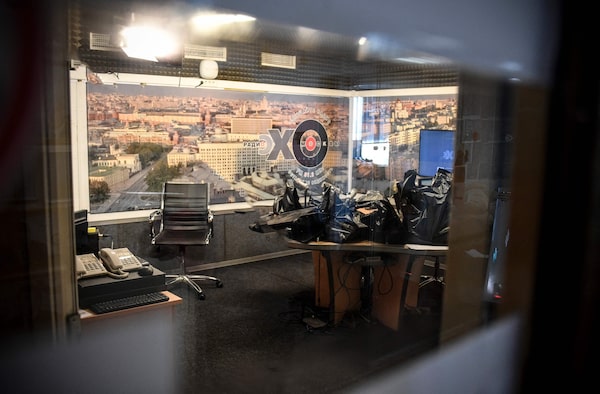
The independent Russian radio Ekho Moskvy (Echo of Moscow), a historic figure in the Russian media landscape, announced its self-dissolution on March 3, after a broadcasting ban by the authorities because of its coverage of the invasion of Ukraine.-/AFP/Getty Images
Yulia Polonskaya hasn’t spoken to her mother in Russia since the invasion of Ukraine began.
After she made posts decrying the conflict, her mother unfollowed her on Instagram, and since then Ms. Polonskaya’s phone calls to her mother have gone unanswered.
Ms. Polonskaya, a 31-year-old translator and writer in Toronto, is one of many Russian-Canadians who are finding that their opinions on the war in Ukraine differ greatly from those of their loved ones back home, and it’s leading to strained relationships.
People like Ms. Polonskaya say their family members, especially those from older generations, find it hard to trust anything other than the views expressed on Russian state media, which claim that the “military operation” – journalists are banned from calling it a war or invasion – was necessary because Western countries have an agenda to weaken Russia.
Last week, the Russian government took the information war to a new level when it enacted a new law under which anyone deemed to be intentionally spreading “fake news” in the country could be sentenced for up to 15 years. This led the CBC, BBC and other major Western media outlets to temporarily suspend their operations in Russia.
The U.S. State Department has accused Russia of waging a “full war on media freedom and truth” by dismantling independent Russian media outlets and blocking access to social-media sites such as Twitter and Facebook.
Ms. Polonskaya says her father, in an effort not to be influenced by “fake news,” is unwilling to trust any information that isn’t from Russian state TV.
Her father will at least still speak with her on the phone, but any time she sends videos and news clips about the war from Western media sources, they are met with skepticism and the belief that the material could be doctored.
Ms. Polonskaya says her parents are holding on to the fact that Russian state media are “the official channel where the information is coming from.”
She said it’s very difficult to have a conversation with her parents in which she accuses the Russian media of lying when they believe that Western media are lying.
In Edmonton, Svetlana Koshkareva, 47, said she also has a hard time explaining her position that Russia is the aggressor in this war when people like her mother firmly believe that the Western world is out to get Russia.
She said the animosity in the “Russia versus the West” rhetoric makes it easier for Russian people to believe when the state media say that Russians themselves are at risk of being attacked.
While much of Ms. Koshkareva’s family lives outside of Russia and does not support the war, her mother is still in Siberia and firmly believes that Russian troops are saving Ukraine.
“It’s like a family tragedy,” said Ms. Koshkareva, who said her brother, who lives in Thailand, has blocked their mother on social media because of all the propaganda she sends.
However, Ms. Koshkareva said it’s hard to blame her mother and says her views are the result of the political climate in which she lives.
When Dmitry Lytov, an IT worker, thinks of Russian attitudes to the war, he thinks of his first Canada Day celebration when he moved to Ottawa 11 years ago.
Mr. Lytov said the event had pavilions from countries around the world, such as a Korean pavilion that would write your name in Korean script or a Turkish pavilion that handed out toys to kids.
He was amused, he said, to see the pavilion set up for Russia was handing out military posters and replicas of the kind of hats that Russian soldiers wear.
To him, life in Russia, and in the Soviet Union beforehand, instilled a sense of pride in military might, which is why he believes that many people are supportive of Russian President Vladimir Putin’s actions in Ukraine.
“Every nation wants to be proud, but they do not know what to be proud of. All examples of what you should be proud of in Russian society are based on war,” said Mr. Lytov, an ethnic Russian who was born in Ukraine and has family and friends in both countries.
“They were not taught how to enjoy normal peaceful life. The Soviet Union taught people how to sacrifice their life for the state.”
He said part of the reason why some of his family in Russia support Mr. Putin’s military actions stems from the belief that Western countries have backed Russia into a corner.
“They say it’s not Russia to blame, but the West who pushed Russia away from world markets and tried to make it a small state,” Mr. Lytov said.
He said his close friends, however, are against the war.
Mr. Lytov said he’s pleased to see that the Russian community in Ottawa has rallied around the Ukrainian community to try and offer support.
“It may be different in other locations, but I’ve enjoyed seeing that here,” he said.
With a report from Reuters
Our Morning Update and Evening Update newsletters are written by Globe editors, giving you a concise summary of the day’s most important headlines. Sign up today.
 Salmaan Farooqui
Salmaan Farooqui